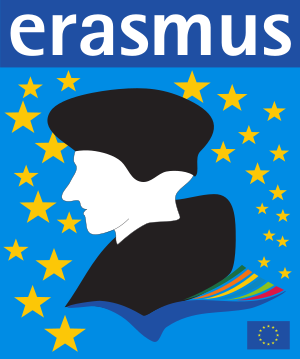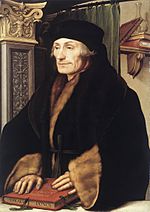Erasmus Programme facts for kids

The Erasmus Programme is a special program from the European Union (EU). It helps university students study abroad in another European country. The full name, "ERASMUS," stands for "EuRopean Community Action Scheme for the Mobility of University Students." It started in 1987.
In 2014, a new program called Erasmus+ (or Erasmus Plus) began. It combines all the EU's programs for education, training, youth, and sports. This new program helps even more young people.
The Erasmus Student Network was created in 1989 by former Erasmus students. This group helps international students. As of 2020, it has over 15,000 volunteers in 42 countries.
By 2014, over 3.3 million students had studied abroad through the Erasmus Programme. More than 5,000 universities in 38 countries take part. Besides students, university teachers can also go abroad to teach for a short time. This is called "teacher mobility."
Contents
History of Erasmus
Why the Name "Erasmus"?
The program is named after a famous Dutch thinker named Desiderius Erasmus of Rotterdam. He was a philosopher, a monk, and a very important person during the Renaissance. Erasmus traveled a lot across Europe. He was one of the first thinkers to use the new printing press to share his ideas widely.
The idea for students to exchange and study in different European countries started in 1969. An Italian educator named Sofia Corradi, often called "Mamma Erasmus," first suggested it. Later, a student group called AEGEE helped convince French President François Mitterrand to support the program.
Thanks to this teamwork, the Erasmus Programme was approved in 1987. It became a key part of other big EU education programs over the years.
How Erasmus Grew
Before 1987, the European Commission had already been helping students exchange for six years. When the Erasmus Programme officially started in 1987, 3,244 students joined in its first year. By 2006, over 150,000 students were taking part each year. That's almost 1% of all European university students!
From 1987 to 2006, more than two million students received Erasmus grants. The program even won the Princess of Asturias Award for International Cooperation in 2004.
Erasmus+ (2014–2020)
Erasmus+ was a huge program from 2014 to 2020. It had a budget of 14.7 billion euros. It brought together many different EU programs for education, training, youth, and sport. This included programs like Erasmus, Leonardo da Vinci, and Comenius.
Erasmus+ offered grants for many activities. Students could do internships abroad. Teachers and school staff could attend training courses in other European countries.
Erasmus+ Programme (2021–2027)
The European Commission planned an even bigger Erasmus program for 2021–2027. They wanted to double the budget to 30 billion euros. This new program was officially adopted in May 2021.
After Brexit, the UK government decided not to be part of the Erasmus program anymore. This means UK students can no longer use Erasmus to study in the EU. Also, EU students cannot use it to study in UK universities.
Who Can Participate?
More than 9 million people have taken part in the Erasmus program since it began. The number of young people joining has grown a lot. Nearly 300,000 people participate each year now.
Spain is a very popular country for Erasmus. It sends more than 40,000 students abroad each year. Spain also receives the most Erasmus students, with over 47,000 coming to study there.
In 2012–13, 270,000 students took part. The most popular places to go were Spain, Germany, Italy, and France. About 5% of all European university graduates in 2012 had been Erasmus students.
Some studies have looked at who participates in Erasmus. They found that while more students can join now, there can still be money barriers for some families.
Requirements for Students
The Erasmus Programme used to be only for university students who had finished at least one year of study. Now, it is also open to students in secondary school.
How It Works
Students who join Erasmus can study for at least three months in another European country. They can also do an internship for at least two months. This period abroad is fully recognized by their home university when they return. This means their studies count towards their degree.
A great part of the program is that students do not pay extra tuition fees to the university they visit. Students can also get an Erasmus grant. This money helps them with the extra costs of living abroad. Students with disabilities can even get more money to cover special expenses.
To help students find places to live, there are free websites like CasaSwap and Eurasmus. These sites help students find, rent, or swap accommodation. They also let students share tips and advice with each other.
The "Erasmus Experience"
Cultural Impact
For many European students, the Erasmus Programme is their first time living and studying in another country. It has become a very popular experience. It has even inspired movies like the French-Spanish film L'Auberge espagnole.
The program helps students learn about and understand their host country. The Erasmus experience is seen as a time for learning, making new friends, and experiencing a different culture.
Teachers often encourage students studying subjects like politics or international relations to join Erasmus. It's a great chance to study abroad without the high costs of studying outside the European Union.
The Erasmus Generation
Some experts believe that former Erasmus students will help create a stronger European identity. They call these young people the "Erasmus generation." This term describes young Europeans who take part in the program. It is thought that they will support European integration more than older generations. This is because they have experienced the benefits of being part of Europe.
The Erasmus program is also seen as a way to build solidarity among Europeans. A study in 2010 showed that participating in Erasmus helps people become more tolerant. It also helps Europeans mix more. For example, more than a quarter of Erasmus participants meet their life partner through the program. The European Commission even estimates that the program has led to the birth of over 1 million children, sometimes called "Erasmus Babies."
Research shows that taking part in an Erasmus exchange can make students feel more connected to Europe. It helps them identify as European.
|
See also
 In Spanish: Programa Erasmus para niños
In Spanish: Programa Erasmus para niños
- Academic mobility
- Comenius programme
- Erasmus Student Network (ESN) – a non-profit European student organization
- Association des États Généraux des Étudiants de l'Europe (AEGEE) – a non-profit European student organization
- European Students' Union (ESU) – a non-profit European student organization
- European Medical Students' Association (EMSA) – a non-profit European medical student organization
- European Students of Industrial Engineering and Management (ESTIEM) – a non-profit European student organization
- European Credit Transfer System (ECTS)
- European Higher Education Area
- Socrates Network for Translator Training
- University Mobility in Asia and the Pacific
- Student exchange programme
- Public diplomacy
- Enhancing Student Mobility through Online Support
 | Laphonza Butler |
 | Daisy Bates |
 | Elizabeth Piper Ensley |


